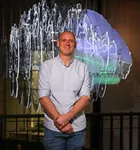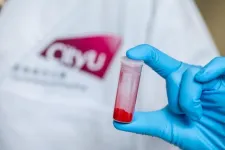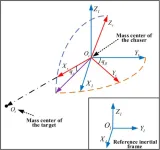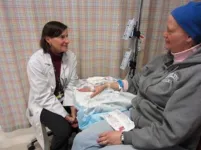Scientists reveal how the effects of psychosis spread throughout the brain
Scientists detail new capacity to map and model the spread of brain changes in people with different stages of psychoses
2023-09-20
(Press-News.org) Psychoses like schizophrenia cost billions of dollars annually and derail the lives of people struggling with the disease. Now Monash University researchers have modelled how the effects of psychosis spread through the brain, allowing them to isolate areas where these changes may originate from and which could be targeted by therapies designed to reduce the disease’s progression.
The study, published today in the prestigious Journal of the American Medical Association Psychiatry, details how the scientists were able to map and model the spread of brain changes in people with different stages of psychoses such as schizophrenia,from people newly diagnosed to those who have experienced psychosis for years.
The study, led by Dr Sid Chopra , from the Turner Institute for Brain and Mental Health and Monash University’s School of Psychological Sciences, identified the hippocampus, which is important for memory, as a possible early site of brain changes in psychosis. “This finding could potentially guide therapies that can target this area of the brain, potentially limiting the impact of the illness or perhaps even reducing the risk of psychosis onset,” he said
The study looked at 534 individuals from four groups, spanning early and late stages of psychotic illness. The researchers used MRI to examine changes in grey matter that occur at the different illness stages
They found that the evolution of psychoses, as measured by changes in great matter, may originate in the hippocampus and gradually spread across the brain, over time, via the nerve or axonal connections. According to Dr Chopra, “we found that the pattern of grey matter change seen in psychosis is not randomly distributed across the brain, but is shaped by a complex network of structural connections – in a very similar way to how we see the progression of neurodegenerative diseases in the brain.”
The researchers used a mathematical model to predict grey matter volume changes in four different groups of people with schizophrenia, scanned at both early and late stages of illness. According to Professor Alex Fornito, who led the research team, “we found consistent evidence that the hippocampus, an area important for memory and which is known to play an important role in schizophrenia, is a candidate epicentre of brain changes in the illness,” he said.
Importantly the researchers were able to distinguish brain changes associated with disease from those linked to the use of antipsychotic medication. “Most research has taken place with people who are already taking antipsychotic medications, making it difficult to disentangle the effects of medication from those of illness,” said Dr Chopra. “Our network-based model was able to account for both medication-related and illness-related brain changes, meaning that brain network architecture represents a fundamental constraint on both types of brain changes in psychosis.”
According to Dr Chopra, the new approach opens new possibilities for understanding the causes of brain changes in schizophrenia, and for forecasting how they might evolve in individual patients. “Our work demonstrates that it is possible to investigate promising mechanisms behind widespread brain changes in schizophrenia, using fairly simple models” he said. “We hope to further extend these models to identify possible treatment targets and predict how the illness might evolve in individual people.”
END
ELSE PRESS RELEASES FROM THIS DATE:
2023-09-20
Santa Barbara, CA and New York, NY -- The Glenn Foundation for Medical Research (GFMR) and the American Federation for Aging Research (AFAR) are pleased to announce the inaugural recipients of the
2023 Glenn Foundation Discovery Awards:
Ya-Chieh Hsu, PhD, Professor of Stem Cell and Regenerative Biology at Harvard University, and a Principal Faculty Member at the Harvard Stem Cell Institute.
Xuebing Wu, PhD, Assistant Professor of Medical Sciences (in Medicine and in Systems Biology), Columbia University.
The Glenn Foundation Discovery Award was created to support research projects with strong potential to develop pioneering discoveries ...
2023-09-20
A team of leading clinicians, engineers, and neuroscientists has made a groundbreaking discovery in the field of treatment-resistant depression. By analyzing the brain activity of patients undergoing deep brain stimulation (DBS), a promising therapy involving implanted electrodes that stimulate the brain, the researchers identified a unique pattern in brain activity that reflects the recovery process in patients with treatment-resistant depression. This pattern, known as a biomarker, serves as a measurable indicator of disease recovery and represents a significant ...
2023-09-20
A research team led by scientists from City University of Hong Kong (CityU) has achieved a significant breakthrough by inventing a new class of near-infrared-activated photo-oxidants that can effectively kill cancer cells without requiring oxygen. The photo-oxidants induce a unique form of cancer cell death that can overcome cancer cell resistance. The findings offer a new strategy, called ‘photo-oxidation therapy’, and provide a promising direction for the development of anti-cancer drugs.
Photodynamic therapy, an innovative ...
2023-09-20
WASHINGTON (September 20, 2023)—The Ann Theodore Foundation Breakthrough Sarcoidosis Initiative (ATF-BSI), in partnership with the Milken Institute, launched its latest round of funding today. Up to $3.4 million in total funding will be made available to researchers from around the world whose work aims to increase scientific understanding of sarcoidosis. The program is accepting applications for two-year research projects and intends to award four to six research grants from doctorate-level investigators at qualifying research-based institutions worldwide. Awardees may be eligible for a third year of funding.
Sarcoidosis is an inflammatory ...
2023-09-20
NEW YORK, NY (September 20, 2023)—Columbia will award the 2023 Louisa Gross Horwitz Prize to Zhijian ‘James’ Chen and Glen Barber for discovering the cGAS-STING pathway, a key component of one of the body’s first line of defenses, the innate immune system.
When pathogens infiltrate our cells, they leave behind traces of their DNA. These molecular fingerprints are detected by our cGAS-STING pathway, which sounds the alarm and mobilizes the immune system to eliminate invading threats. Research on the cGAS-STING pathway has revealed the ...
2023-09-20
The past few decades have witnessed the burgeoning development of on-orbit servicing in light of various meaningful space applications such as repair of malfunctioning satellites, debris removal, on-orbit assembly, and so on. As for the orbit-servicing targets, they are usually divided into 2 categories, i.e., cooperative and non-cooperative ones, based on whether the space targets have active cross-link communication and cooperative identifiers with the servicing spacecraft or not. Before executing the orbit-servicing task, close-range rendezvous and proximity is an inevitable process in which ...
2023-09-20
An Australian-first biobank will be established to improve and discover new treatments for children with genetic muscle diseases.
The National Muscle Disease Bio-databank, co-led by Murdoch Children’s Research Institute, Monash University and Alfred Health, will advance research into understanding why children develop genetic muscle diseases. The project forms part of a $2.5 million Medical Research Future Fund grant awarded to the team for research into congenital muscle diseases.
These diseases, spanning dystrophies and myopathies, are characterised by severe muscle weakness, usually from infancy, that can impact swallowing, ...
2023-09-20
Liver cancer is one of the most prevalent and deadly types of cancer worldwide. Most patients are diagnosed at an advanced stage, which leaves them with few treatment options. Unfortunately, the first-line drugs used in advanced hepatocellular carcinoma (HCC), the most common type of liver cancer, are not very effective and offer only modest clinical benefits.
Over the past few years, scientists have been trying to develop new therapies for HCC by analyzing specific genetic abnormalities and the ways in which they affect the manifestation and progression of the disease. One of the most common mutations in HCC ...
2023-09-20
The State Council of Higher Education for Virginia (SCHEV) approved Tuesday the creation of an undergraduate major for the University of Virginia’s School of Data Science, a landmark development for the four-year-old school, which was the first of its kind in the nation.
Prior to Tuesday’s announcement, undergraduates could obtain a minor in data science, while graduate students could pursue master’s or doctoral degrees. Now, the establishment of the B.S. in Data Science will allow UVA’s undergraduates to focus their studies on this emerging and growing interdisciplinary field.
“The B.S. in Data Science major is a major milestone ...
2023-09-20
Highlights:
Organisms, including viruses, live in the deepest, darkest places on the planet
Marine virologists analyzed sediment from the Mariana Trench, the deepest place on Earth, and identified a new bacteriophage
The phage infects Halomonas bacteria, which have been found in deep-sea environments and near hydrothermal vents
The study helps probe how phages and hosts evolve together in secluded, hostile environments
Washington, D.C. — The Mariana Trench, the deepest place on Earth, plunges nearly 11,000 meters at its lowest point on the floor ...
LAST 30 PRESS RELEASES:
[Press-News.org] Scientists reveal how the effects of psychosis spread throughout the brain
Scientists detail new capacity to map and model the spread of brain changes in people with different stages of psychoses







